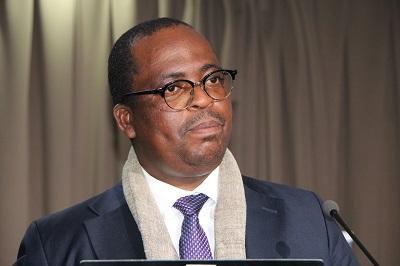Africa-Press – Lesotho. The Central Bank of Lesotho (CBL)’s Monetary Policy Committee (MPC) has reduced the CBL rate to 7.00% per annum to 7.25%, citing reduced inflation.
MPC convened its 113th meeting yesterday, assessing recent economic developments at the global, regional, and domestic levels.
In response to persisting economic headwinds, the Committee made the critical decision to reduce the CBL rate from 7.25% to 7.00% per annum in a bid to support domestic economic activity.
Governor CBL, Dr Maluke Letete, in his remarks, highlighted that the cut is due to the reduction of inflation, hence the committee saw it fit to reduce the rates.
However, he noted that Lesotho is still in trade war, which might hinder the very same inflation decline. “We want to repeat and say to society, the war is not over, we are now under trade tensions that might cause more destructions in the future,” said Dr Letete.
He highlighted that most countries are looking within their own boundaries which hinders trading opportunities, and could result in an increase of inflation.
While reading the report, Dr Letete said the global economic landscape remains fragile, with uneven growth across major economies in the first quarter of 2025. While the Euro area showed resilience through strong domestic demand, and Japan benefitted from buoyant exports, the United States and the United Kingdom lost momentum amid declining consumer and government spending.
Meanwhile, China and India registered positive growth, supported by stimulus and industrial expansion, respectively.
However, the report shows that the International Monetary Fund (IMF) revised global growth projections downward to 2.8% for 2025, citing rising trade tensions and protectionist policies that have dented investment flows and global business confidence. Geopolitical uncertainty, slowing productivity, and financial market volatility continue to weigh on the outlook.
Dr Letete also noted that Lesotho’s domestic economy has contracted sharply by 5.3% in the first quarter of 2025. The downturn was largely attributed to weak consumer demand, reduced government expenditure, and underperformance in key sectors such as transport and construction.
Yet despite some resilience in the manufacturing and financial sectors spurred by textile exports and credit expansion, the broader economic outlook remains unresponsive.
Adding to the strain are escalating global tariffs impacting Lesotho’s textile industry, the phasing out of crucial development aid like the Millennium Challenge Corporation (MCC), and continued sluggishness in the diamond market.
On a more positive note, inflation eased slightly to 4.0% in April 2025, down from 4.2% in March, largely due to falling global oil prices and a stronger loti against the US dollar, which helped reduce fuel prices.
Food prices remained stable, providing some relief to households. However, future inflation risks persist amid global trade uncertainties and policy volatility.
Yet despite the economic contraction, Lesotho’s fiscal policy remained prudent. The country recorded a budget surplus of 12.9% in Q1 2025, even amid weaker VAT collections. The government sustained counter-cyclical spending focused on infrastructure and social support, while public debt fell to 53.8% of GDP due to bond redemptions and external debt repayments, demonstrating the government’s commitment to fiscal sustainability.
The current account surplus narrowed to 0.7% of GDP, largely due to falling exports and increased service payments. Nevertheless, foreign reserves remain robust, standing at 5.3 months of import cover.
The Net International Reserves (NIR) position improved significantly, rising by US$40.3 million (about M360 million) to US$1.07 billion (about M18 billion) — boosted by strong Southern African Customs Union (SACU) receipts.
MPC anticipates continued strengthening of NIR in the short to medium term.
Dr Letete reaffirmed CBL unwavering commitment to maintaining the one-to-one peg between the loti and the South African rand, which remains the bedrock of Lesotho’s monetary policy and price stability objectives.
As Lesotho navigates a challenging economic landscape, the combination of sound fiscal management, prudent monetary policy, and external reserve stability provides a foundation for resilience.
However, sustaining growth will depend on mitigating external shocks, reviving domestic demand, and boosting competitiveness in key sectors.
For More News And Analysis About Lesotho Follow Africa-Press






